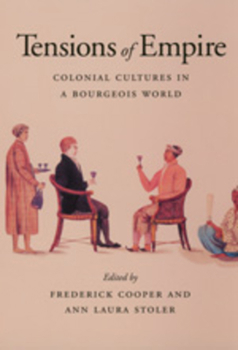Tensions of Empire: Colonial Cultures in a Bourgeois World
Select Format
Select Condition 
Book Overview
Starting with the premise that Europe was made by its imperial projects as much as colonial encounters were shaped by events and conflicts in Europe, the contributors to Tensions of Empire investigate metropolitan-colonial relationships from a new perspective. The fifteen essays demonstrate various ways in which "civilizing missions" in both metropolis and colony provided new sites for clarifying a bourgeois order. Focusing on the eighteenth, nineteenth, and early twentieth centuries, they show how new definitions of modernity and welfare were developed and how new discourses and practices of inclusion and exclusion were contested and worked out. The contributors argue that colonial studies can no longer be confined to the units of analysis on which it once relied; instead of being the study of "the colonized," it must account for the shifting political terrain on which the very categories of colonized and colonizer have been shaped and patterned at different times.
Format:Paperback
Language:English
ISBN:0520206053
ISBN13:9780520206052
Release Date:February 1997
Publisher:University of California Press
Length:463 Pages
Weight:1.47 lbs.
Dimensions:1.0" x 6.8" x 9.0"
Customer Reviews
1 rating
A Multi-disciplinary Treatment of the Exclusionary "Other"
Published by Thriftbooks.com User , 20 years ago
In this collection of essays, Frederick Cooper and Ann Laura Stoler have attempted to shed light on an often overlooked aspect of European imperialism; the colonized. Specifically, the authors contend it is that gray area "between the public institutions of the colonial state and the intimate reaches of people's lives that seemed to us to demand more attention." Realizing the diversity of the European colonial experience, the authors wanted to examine whether or not there exists a correlation between the archival histories of the major European imperial powers-Germany, France, Great Britain and the Netherlands. Incorporating what some historians have referred to as "the holy trinity"-gender, race and class-Cooper and Stoler have collected an assemblage of scholarship that takes a look at the indigenous experience, or as the title suggests, tensions that existed within the exclusionary "Other" and their culture of colonization. In keeping with the French Annalist, Marxist tradition of social-economic historiography that had grown popular in the 1960's and 1970's, the essays not only reinforce the evils of capitalistic exploitation, but also incorporate to a large extent, the field of anthropology to the blurred genres of interdisciplinary scholarship. In a sense, the articles read like anthropological field studies in an historical setting. For example, in "Le Bebe en Brousse: European Women, African Birth Spacing, and Colonial Intervention in Breast Feeding in the Belgian Congo" (pp. 287-321), Nancy Rose Hunt, examines the affect colonial institutions had upon a natural birth control method common in many underdeveloped countries, prolonged breast feeding, or birth spacing. Birth spacing and the ethnographic cocoon in which it rests are usually the work of anthropologists not historians. But as we can see from Ms Hunt's argument, the combination of cultural and political studies makes for an interesting blend of social history. In a similar essay titled: "Sexual Affronts and Racial Frontiers: European Identities and the Cultural Politics of Exclusion in Colonial Southeast Asia" (pp.198-237), Ann Stoler examines the problem of colonial and indigenous union-"mixed bloods"-and the affects this relationship between inclusionary impulses and exclusionary practices has on French and Dutch nationalism. Here again, as her subtitle suggests, the blending of culture and politics, usually the stuff of varying floors of a Humanities building, has come together in a compatible marriage. This book might not appeal to those accustomed to the standard fair of colonial history. The editor's long and winded introduction does not fully prepare the reader for the interesting essays that follow. Had the editors added a conclusion tying the confusing section headings together, and concisely formulated their opening, the finished product would have been more easily digestible. Ending on a positive note, the lengthy bibliography at the end of each article provides the r






